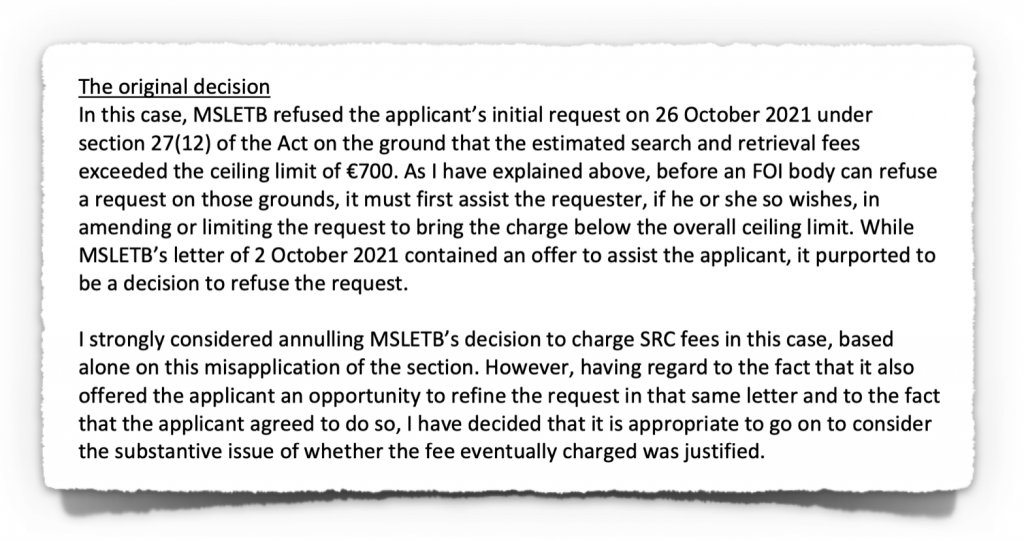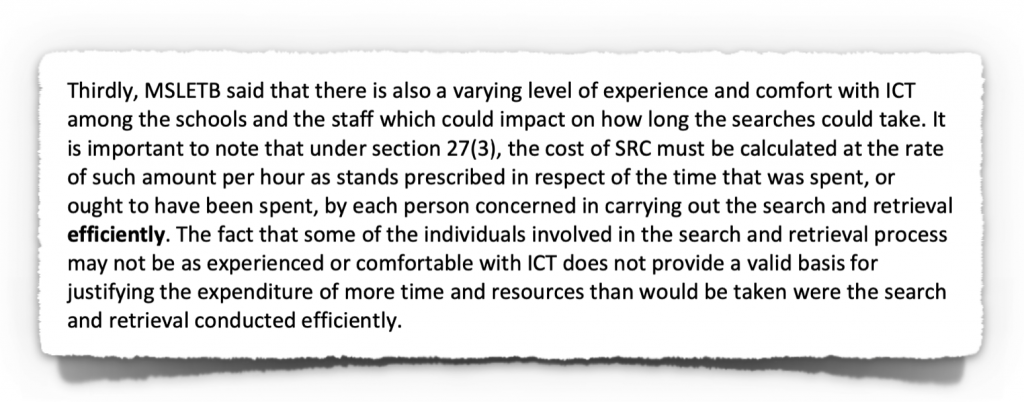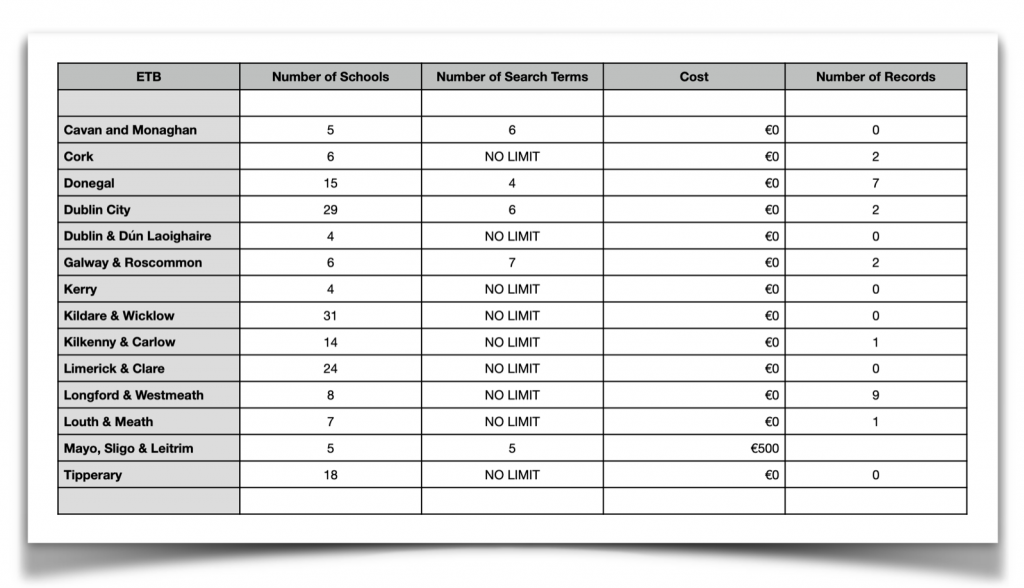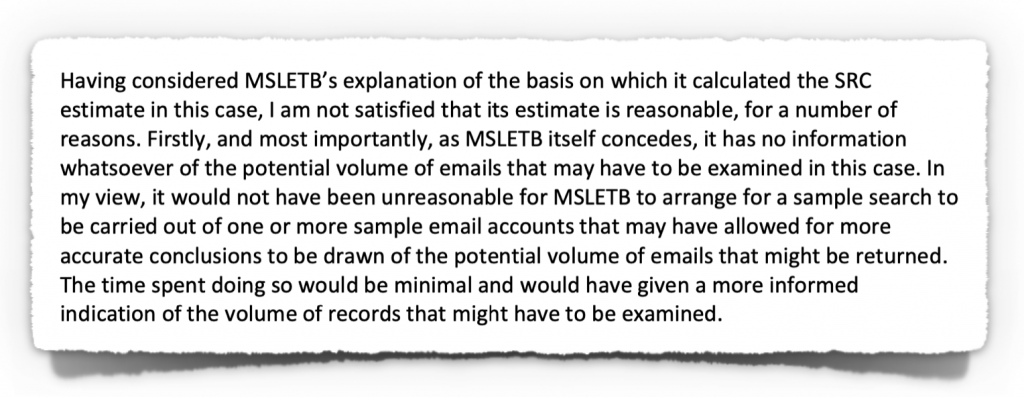I have made more Freedom of Information (FoI) requests than I care to count, which have included those required to address the University Chaplain issue. Anyone who has had more than a passing familiarity with this process, will understand that public bodies in Ireland use several tactics that tend to frustrate the goal of the legislation. The Freedom Of Information Act seeks to ensure that with some exceptions, citizens should have access to information about how the public services that they pay for are managed and operated. Perhaps the tactic that most often deters applications for records within public bodies, is the arbitrary imposition of prohibitive costs. However, the charging of excessive fees for FoI requests is also among the easiest of obstacles for applicants to challenge.
At the bottom of this page are full copies of all documents associated with a FoI request that I submitted to Mayo, Sligo and Leitrim Education and Training Board (MSLETB). That public body decided to impose excessive fees in relation to my application, but the Office of the Information Commissioner (OIC) has recently annulled the MSLETB decision. I am grateful for the significant detail included within the Decision that has been published by the OIC. Their document sets out both the entitlements of applicants and the obligations on public bodies in general terms, as well as describing why some frequently used justifications for excessive fees are bogus. These documents may be useful for others experiencing similar difficulties with FoI applications. Specifically, this case represents a case study in the value of appealing excessive fees, rather than being deterred by arbitrarily imposed costs.
One important point to note with regard to OIC appeals against fees imposed by public bodies, is that there is no cost associated with such appeals. When submitting an appeal in relation to how a public body has processed a request for records under FoI, there is often a €50 fee that must be paid up front to the OIC. However, there are a number of cases in which no fee applies at the OIC, and an appeal against excessive costs being demanded is one such exception.
My Original FoI Request
On 12th October 2021, I submitted a formal FoI request to MSLETB. The full text of that request is available at the bottom of this page. I sought documents that had been received by MSLETB schools, inviting them to religion in-service days. These are typically off-site training courses that provide Continuous Professional Development (CPD) for teachers, for example to explain how new aspects of a curriculum should be delivered in the classroom as the syllabus changes over time. I sought to limit the scope of my request in the following ways:
- it related to emails only, as a specific category of electronic documents that are easily searchable
- it related to a fixed period of time (calendar year 2016)
- it related only to invitations received by MSLETB schools and not to any responses (so that there was no personal information sought, such as which teachers attended which locations on which dates)
For most subjects there would be at most one in-service day per annum, and often none at all. As such, I did not anticipate that that this request would return a large number of records. However, on 26th October 2021, MSLETB rejected my request on the basis that the volume of ‘search, retrieval and copying’ (SRC) work that would be required, exceeded the ‘ceiling limit’ of 36 hours. The letter from MSLETB describing their rationale is available at the bottom of this page.
My Refinement Of Scope
Before a public body refuses a FoI request on the basis that the volume of work involved would exceed the ceiling limit, they must first seek to assist the applicant in refining the scope of the request. The full OIC Decision in this case is available at the bottom of this page, but the extract illustrated below deals with the issue of helping applicants to refine scope.

Over the subsequent two weeks, I exchanged several emails with MSLETB that sought to refine the scope of request. This discussion became a little contentious, and a full copy of the entire email thread is available at the bottom of this page.
Initially, I reduced the scope from all 17 MSLETB schools to just 5 of their schools. Then I specified that only the religion teachers and principals in those schools need search their inbox, rather than all teachers in those schools. Lastly, I specified which specific search terms should be used when seeking the records that match my request, and this is where there was some disagreement about what may be reasonably expected of public bodies. Specifically, MSLETB seemed to suggest that some of their staff would find it difficult to understand how to conduct such a narrowly targeted search of their emails. The extract from the Decision that is illustrated below, describes how the OIC viewed this issue.

The Freedom Of Information Act requires that cost estimates be calculated on the basis of the time taken to conduct ‘efficient’ searches. If a public body does not employ staff that are capable of performing efficient searches for records, then it is their obligation to hire such staff. A claim by a public body that their staff would find it difficult and time-consuming to conduct a simple electronic search, is not a valid reason to impose excessive fees on FoI applicants.
On 11th November 2021, MSLETB wrote to me indicating that it would take 26 hours work to process the SRC tasks associated with my refined FoI request, and they sought to charge me €500. The full MSLETB correspondence describing these figures is available at the bottom of this page.
Review By Senior Management
The Freedom of Information Act requires that an applicant who is dissatisfied with the response of a public body, must initially seek a review of the decision by a more senior member of that organisation. On 11th November 2021 I sought such a review by a more senior member of the management team at MSLETB. The full text of my request for review is available at the bottom of this page.
It is useful to note that I had sent an identical FoI request to every ETB in the country, and by the date of the review the others had already responded to me. As such, in my request for review I was able to contrast the excessive fees imposed by MSLETB with the very different approaches taken by all other ETBs. Specifically, my request to MSLETB had been the most narrowly refined, such that all other ETBs were had been asked to search more schools using wider criteria. Notwithstanding the fact that they should have had much less SRC work to do than any other ETB, the table below illustrates how much of an outlier MSLETB were with respect to their cost estimate.

On 2nd December 2021, I received the result of the internal review. Despite being provided with the details contrasting the MSLETB estimates with those of other ETBs, a Director at MSLETB upheld the original cost estimates provided to me. A full copy of the relevant correspondence describing the outcome of this review, is available at the bottom of this page. One component of the estimate that seemed especially unreasonable, was their expectation that the requested searches would turn up a very large number of records. This was despite the fact that I had already provided details to MSLETB of other ETBs that found few (if any) records when making the same searches. The extract from the Decision that is illustrated below, describes how the OIC viewed this issue.

It is not reasonable for a public body to demand large fees for FoI requests purely by imagining that the searches might turn up a large number of documents to review. Any such sizeable estimates must have some basis, such as the results of a few sample searches.
My Appeal To The OIC
On 2nd December 2021 I appealed the fees sought by MSLETB to the OIC. A full copy of the appeal that I submitted is available at the bottom of this page. This appeal included some responses to the same FoI request that I received from several other ETBs. These show much more extensive searches being carried out, with few (if any) records being returned from the searches, and no fees whatsoever being charged. Those other example FoI responses are also available at the bottom of this page.
One of the arguments made by MSLETB during the appeal process, was that their organisation is already under-resourced and that responding to FoI requests would increase the burden on their staff. Of course, the amount of time required to perform a specific document search does not increase or decrease depending on the existing workload within any public body. The extract from the Decision that is illustrated below, describes how the OIC viewed this issue.

It does not make any sense to suggest that the MSLETB calculation resulting in a 26 hour estimate for the requested search, was based on the existing workload on their organisation. However, that MSLETB argued to the OIC that their existing workload was a relevant factor in the process, suggests that this was less a good-faith calculation consistent with the Freedom Of Information Act, and more a mechanism designed to avoid additional work.
Conclusion
It is not at all uncommon for public bodies to apply excessive fees for a simple electronic search of their records. The extract from the OIC Decision that is illustrated below, demonstrates that such responses to FoI requests can be annulled.

The full OIC Decision in this case is dated 11th May 2022 with Case Number OIC-116830-T4D8J5, and it is available at the bottom of this page. It is disappointing that so many public bodies take an obstructive approach to FoI requests. It would often take less time to perform the requested searches than to work through the OIC appeal process. However, demands for excessive fees are among the easier hindrances for applicants to address, it is worth objecting when this situation arises.
- 2021-10-12 My Original FoI Request to MSLETB
- 2021-10-26 MSLETB Response to my FoI Request
- 2021-11-03 Email Thread Refining the Scope of the FoI Request
- 2021-11-11 MSLETB Estimate Of Fees For Refined Scope
- 2021-11-11 My Request for an Internal Review of the Fees
- 2021-12-02 MSLETB Internal Review Upholds Original Estimate of Fees
- 2021-12-02 My Appeal to the OIC against the MSLETB Estimate of Fees
- 2022-05-11 Full OIC Decision Annulling the Estimate of Fees
2 responses to “Excessive FoI Fees”
[…] Ireland, Freedom of Information is neither free nor informative, because public bodies often provide untruthful statements in response to FoI […]
[…] when the OIC finds against a public body, they will annul the original decision and then ask the public body to consider the FoI request afresh. In this case though, the OIC directed that The Religious Sisters of Charity Health Service […]